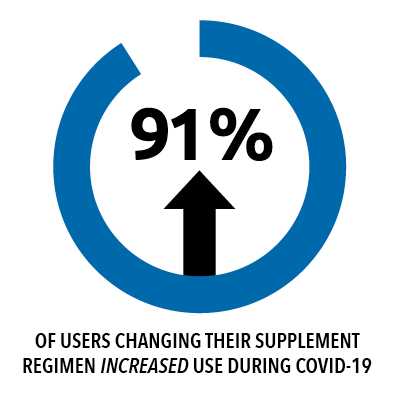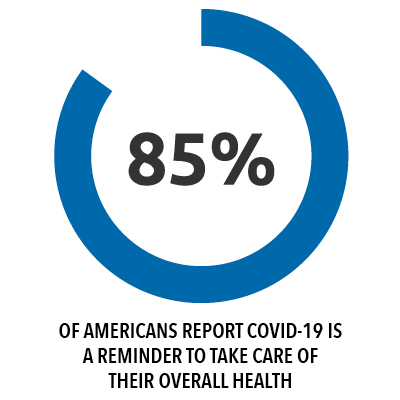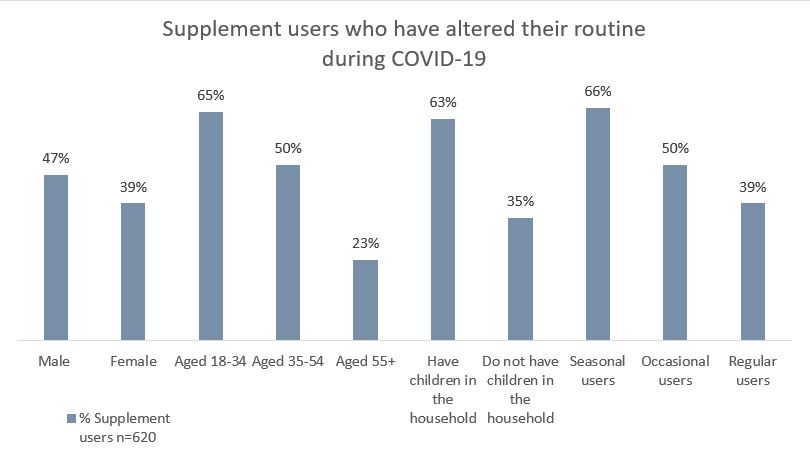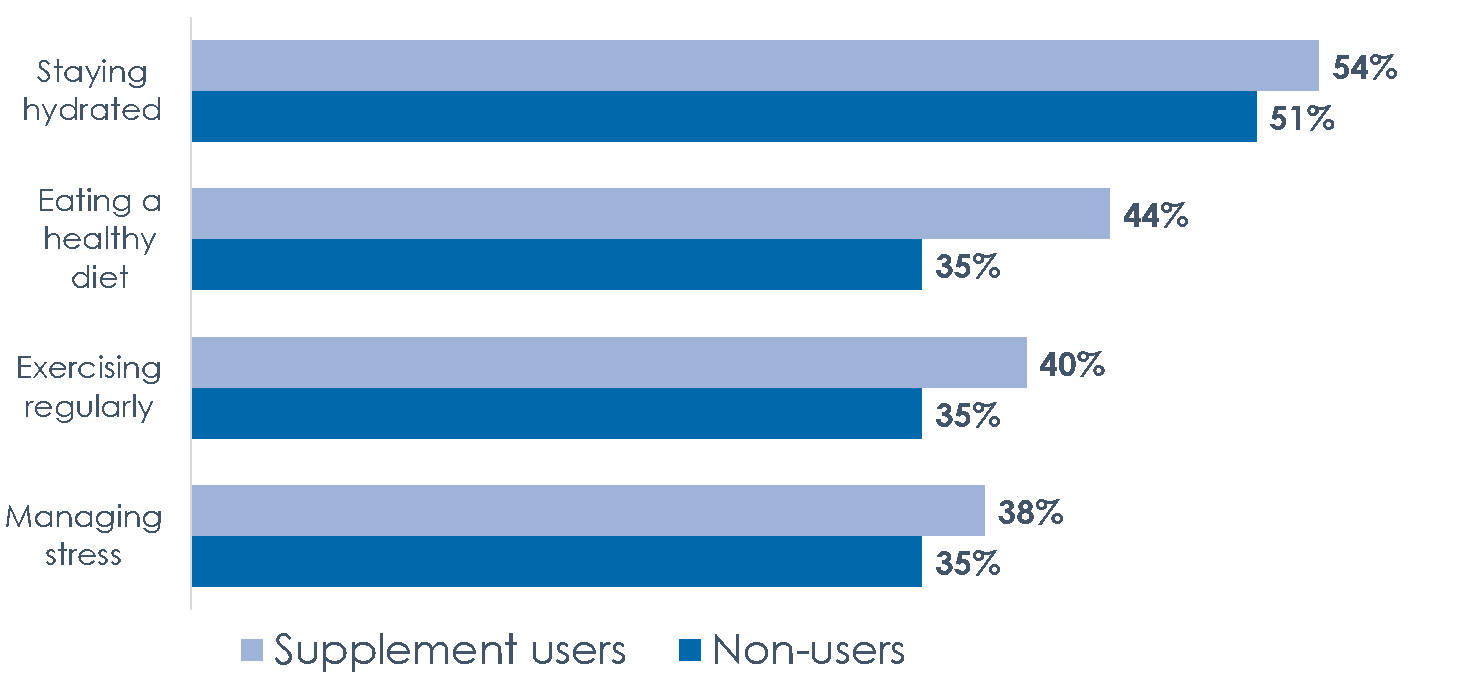Updated data available
Read topline results in recent CRN press release: Dietary Supplement Usage Up Dramatically During Pandemic, New Ipsos-CRN Survey Shows.
Get insights about what matters most: our consumer
Throughout the COVID-19 pandemic, we have all witnessed the booming sales data, the empty shelves, and the out of stocks coming from the supplement aisle. However, there is more to discover about the attitudes and behaviors of the supplement consumer throughout the health crisis. Restricted access, less disposable income and sustained changes in lifestyle behaviors continue to affect household purchasing habits of Americans across the country—including dietary supplements.
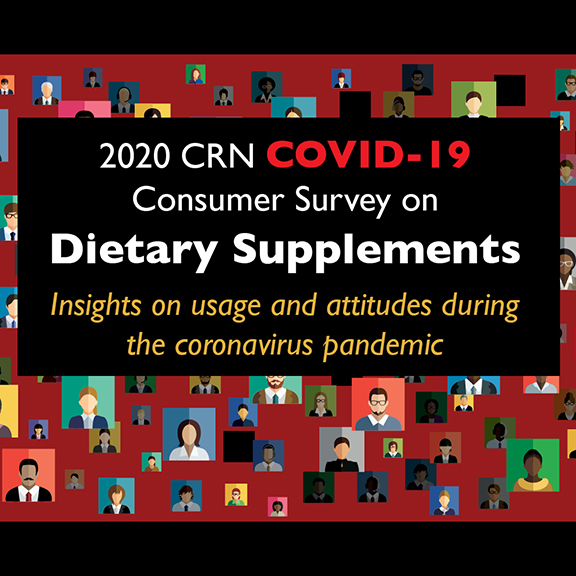 CRN’s COVID-19 and 2020 surveys reveal insights into changes in supplement usage throughout the pandemic and overall usage of supplements over the past year. While the COVID-19 survey demonstrates a subset of supplement users have increased their supplement routine, 2020 data reveals that the overall usage among Americans is slightly down from previous years. Do not miss the opportunity to access these critical resources to gain insight about the supplement consumer and navigate usage trends throughout the pandemic.
CRN’s COVID-19 and 2020 surveys reveal insights into changes in supplement usage throughout the pandemic and overall usage of supplements over the past year. While the COVID-19 survey demonstrates a subset of supplement users have increased their supplement routine, 2020 data reveals that the overall usage among Americans is slightly down from previous years. Do not miss the opportunity to access these critical resources to gain insight about the supplement consumer and navigate usage trends throughout the pandemic.
Purchase now through our online store (discounts available for CRN Members)—or contact Emily Zavrel with questions.
About the CRN COVID-19 Consumer Survey on Dietary Supplements
For over two decades, the CRN Consumer Survey on Dietary Supplements has served as the leading source for data on the attitudes and behaviors of the dietary supplement consumer. In addition to its full annual consumer survey, CRN has issued a separate coronavirus-focused consumer survey to provide insights into changes in usage and attitudes about dietary supplement in light of the pandemic. 
- How usage of specific dietary supplements within the categories of vitamins & minerals, herbals & botanicals, specialty supplements (e.g. probiotics, omega-3 fatty acids, collagen, etc.), sports nutrition and weight management has changed since the COVID-19 pandemic began
- Dietary supplement ingredients that supplement users report increase dosage(s), start taking, or start taking more regularly during the COVID-19 pandemic
- Reasons for increasing/decreasing supplement usage during pandemic
- Influencers for changing supplement routine
- Purchasing habits and changes in light of the pandemic
- Impact of COVID-19 on other lifestyle behaviors
- And more
For more information on survey details or purchasing information, contact Emily Zavrel.
Topline highlights
Who has altered their supplement routine during COVID-19?
What ingredients have seen the biggest boosts in supplement intake during the pandemic?
Supplement users more likely to actively practice healthy lifestyle habits during the pandemic, CRN survey shows
CITING OUR DATA? Please reference: “CRN COVID-19 Consumer Survey on Dietary Supplements www.crnusa.org/COVID19survey”
Additional data
CRN survey shows growth in sports nutrition supplement use during COVID-19
CRN survey highlights need for vigilance against illegal claims
Older adults increase and maintain supplement use in light of pandemic
Survey Timelines and Support Information
COVID-19 survey
Interviews were conducted at the end of July 2020. The data is weighted to the U.S. current population by gender, age, education, and ethnicity. The data and additional executive summary from Ipsos is available now.
2020 Survey
Interviews were conducted online at the end of August 2020. The data is weighted to the U.S. current population by gender, age, education, and ethnicity. The data and additional executive summary and report PPT from Ipsos are available now.
CRN Member Company Support
The COVID-19 and annual CRN Consumer Survey are self-funded initiatives, meaning CRN member companies pay for the survey data and accompanying executive reports from Ipsos.
Consumer Survey Advisory Committee
CRN member companies who join the advisory committee have the opportunity to review the survey questionnaires. Advisory committee participation requires a minimal amount of time with a request to review the questionnaires, suggest edits, and help draw consensus among the committee.


